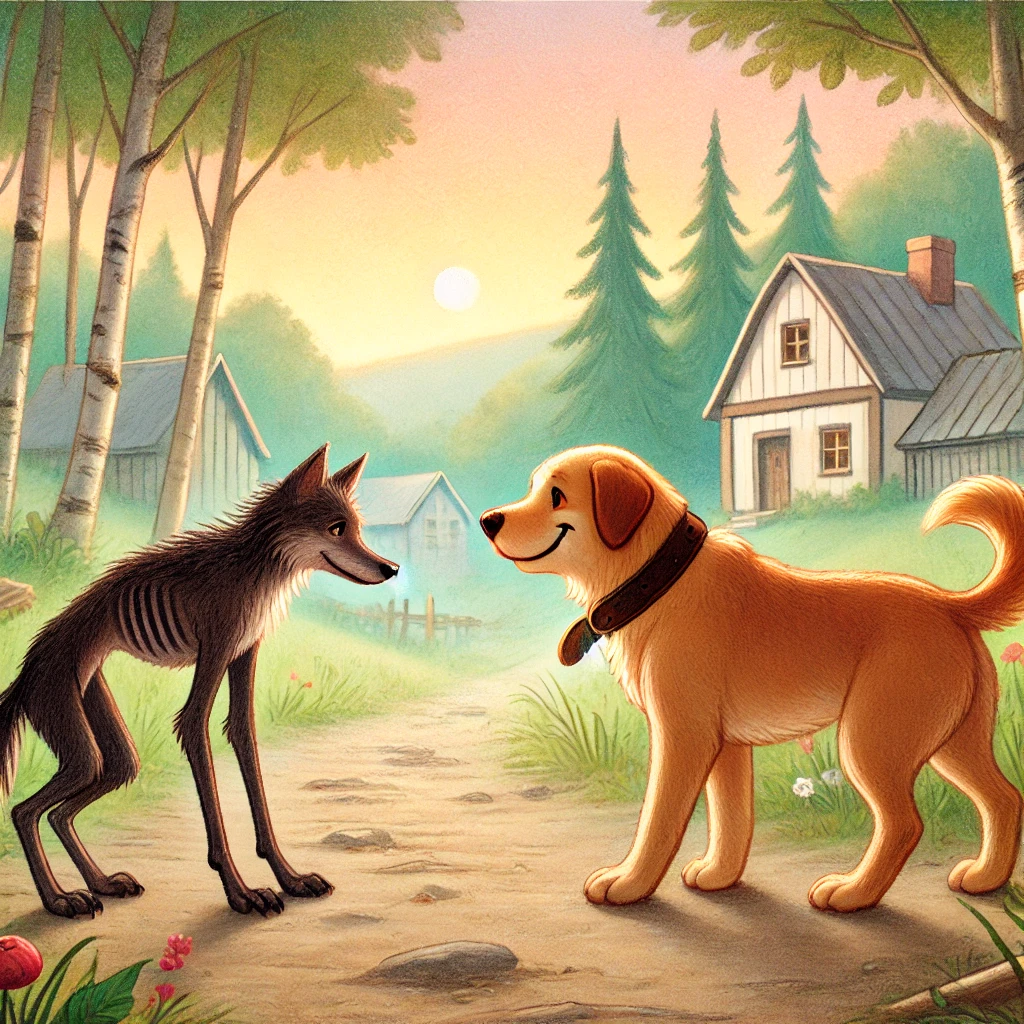A hungry Wolf was almost dead when he met a House-Dog. The Dog said, “Hello, cousin! I knew this would happen. Your wild life will ruin you. Why don’t you work like me and get food every day?”
The Wolf said, “I don’t mind, but I don’t have a job.”
The Dog said, “I can help. Come with me to my master and you can work with me.”
The Wolf and the Dog walked to the town together. On the way, the Wolf saw that the hair on the Dog’s neck was worn away. The Wolf asked, “What happened to your neck?”
The Dog said, “It’s nothing. It’s where my collar is at night. It rubs a little, but I get used to it.”
The Wolf said, “Is that so? Goodbye, Dog.”
It is better to be free and hungry than to be a full but chained slave.
hungry – 空腹の
almost – ほとんど
dead – 死んだ
met – 会った
wild – 野生の
ruin – だめにする
work – 働く
food – 食べ物
every day – 毎日
don’t mind – 嫌ではない
job – 仕事
help – 手伝う
master – 主人
together – 一緒に
town – 町
neck – 首
worn away – 擦り減った
nothing – 大したことない
collar – 首輪
rub – 擦れる
get used to – 慣れる
goodbye – さようなら
free – 自由な
slave – 奴隷
better – より良い
1. A hungry Wolf was almost dead when he met a House-Dog.
- A hungry Wolf: “A” は不定冠詞で、一般的な名詞に使います。”hungry” は形容詞で「空腹の」を意味し、名詞 “Wolf”(オオカミ)を修飾しています。
- was almost dead: “was” は「be動詞」で過去形。状態を表し、”dead”(死んだ)を補語としています。”almost” は副詞で「ほとんど」を意味し、”dead” を修飾しています。
- when he met a House-Dog: “when” は接続詞で、過去の一つの時点を示します。”he met” は過去形の動作で、「彼が会った」という意味です。”a House-Dog” は同じく不定冠詞と名詞で、「飼い犬」を指します。
2. The Dog said, “Hello, cousin! I knew this would happen. Your wild life will ruin you. Why don’t you work like me and get food every day?”
- The Dog said: “The” は定冠詞で、文脈上すでに言及された「犬」を指します。”said” は「言った」の過去形です。
- “Hello, cousin!”: これは直接の呼びかけです。”cousin” は比喩的に使われており、親しい関係を表しています。
- I knew this would happen: “I knew” は過去形で、「知っていた」を意味します。”this would happen” の “would” は過去の未来を表し、「こうなるだろう」という意味です。
- Your wild life will ruin you: “Your wild life” は所有格の “your” と名詞句。”wild life” は「野生の生活」を意味します。”will” は未来を表し、”ruin”(破滅させる)は動詞です。目的語 “you”(あなたを)に影響を及ぼすことを示します。
- Why don’t you work like me and get food every day?: “Why don’t you” は提案を意味します。「~したらどう?」の意味です。”work” と “get” は動詞で、動作を示します。”like me” は比較を表し、「私のように」を意味します。”every day” は副詞句で「毎日」を表します。
3. The Wolf said, “I don’t mind, but I don’t have a job.”
- The Wolf said: 同様に、過去形の “said” を使って会話が進みます。
- “I don’t mind”: 否定形の「気にしない」を意味します。”don’t” は “do not” の短縮形で、現在形です。
- “but I don’t have a job”: “but” は逆接の接続詞です。”I don’t have” は「持っていない」の現在形で、”a job” は「仕事」を指します。
4. The Dog said, “I can help. Come with me to my master and you can work with me.”
- The Dog said: 同じく過去形でのセリフの導入です。
- “I can help”: “can” は可能性や能力を表す助動詞で、「手伝えるよ」という意味です。
- “Come with me”: 命令形で、「一緒に来て」という指示です。
- “to my master”: “to” は前置詞で、方向を表しています。”my master” は「私の主人」を指します。
- “and you can work with me”: “and” は接続詞です。”you can work” の “can” は同様に能力を示し、「働ける」という意味です。”with me” は「私と一緒に」という意味です。
5. The Wolf and the Dog walked to the town together.
- The Wolf and the Dog: “and” で二つの名詞を結んでいます。
- walked: 動詞 “walk” の過去形で、「歩いた」という意味です。
- to the town: “to” は前置詞で方向を示し、”the town”(その町)を目的地にします。
- together: 副詞で、「一緒に」という意味です。
6. On the way, the Wolf saw that the hair on the Dog’s neck was worn away.
- On the way: 副詞句で「途中で」を意味します。
- the Wolf saw: “saw” は「見た」の過去形です。
- that the hair on the Dog’s neck was worn away: “that” は名詞節を導き、”the hair on the Dog’s neck” が主語で、「犬の首の毛」を意味します。”was worn away” は受動態で、「擦り減っていた」を表しています。
7. The Wolf asked, “What happened to your neck?”
- The Wolf asked: “asked” は「尋ねた」の過去形です。
- “What happened to your neck?”: “What happened” は「何が起こった?」の疑問文です。”to your neck” は前置詞句で「あなたの首に」という意味です。
8. The Dog said, “It’s nothing. It’s where my collar is at night. It rubs a little, but I get used to it.”
- The Dog said: 同様に、”said” は過去形です。
- “It’s nothing”: “It is” の短縮形で、「大したことない」という意味です。
- “It’s where my collar is at night”: “where” は場所を示し、”my collar is”(首輪がある場所)を説明しています。”at night” は「夜に」という時間を示します。
- “It rubs a little”: “rubs” は「擦れる」という意味の現在形です。”a little” は副詞句で「少し」を意味します。
- “but I get used to it”: “get used to” は「慣れる」を意味する表現です。
9. The Wolf said, “Is that so? Goodbye, Dog.”
- The Wolf said: “said” の過去形。
- “Is that so?”: 疑問文で「そうなのか?」という意味です。
- “Goodbye, Dog”: “Goodbye” は別れの挨拶です。
10. It is better to be free and hungry than to be a full but chained slave.
- It is better to: 比較表現で、「~する方が良い」という意味です。
- to be free and hungry: “to be” は不定詞で、”free”(自由)と “hungry”(空腹)の両方を説明しています。
- than to be a full but chained slave: “than” は比較の接続詞です。”to be a full”(満腹である)と “chained slave”(鎖につながれた奴隷)の対比をしています。”but” は逆接の接続詞で、「でも、~」を意味します。



コメント